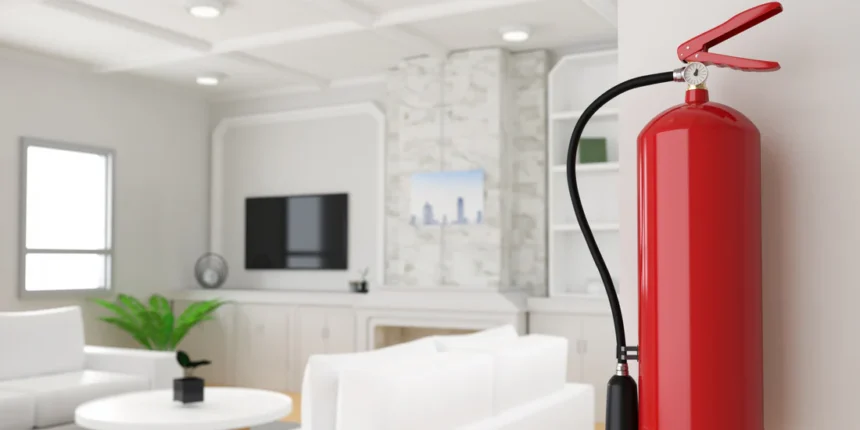Fire extinguishers are essential safety tools — not just for businesses or public buildings, but for households too. While we all hope never to need one, having an extinguisher within easy reach during an emergency can make a life-saving difference. But simply owning one isn’t enough. Storing it correctly is just as important.
Is It Required?
Technically, UK law doesn’t require fire extinguishers in private residences. However, guidance from bodies like the British Standards Institution (BSI), Fire and Rescue Services, and organisations such as Fire Protection Association (FPA) strongly recommend having at least one multi-purpose extinguisher in the home — especially in areas with higher fire risk, like the kitchen or garage.
So, if you’ve chosen to equip your home responsibly, the next key step is: where and how should you store it?
Best Places to Store an Extinguisher at Home
- The Kitchen — But Not Too Close to the Hob
Most house fires start in the kitchen, often due to cooking incidents. This makes it the most logical location for a fire extinguisher. But storing one right above or next to the cooker isn’t advised. If flames flare up on the hob, you won’t be able to safely access the extinguisher.
Best practice: Mount it on the wall near the kitchen entrance, or inside a cupboard door that’s easily accessible, around 1–1.5 metres off the ground.
- The Garage or Utility Room
Garages and utility spaces often house electrical equipment, power tools, or flammable liquids — all of which present fire risks. A dry powder extinguisher or foam extinguisher is ideal in these settings.
- The Hallway or Near Staircases
This ensures the extinguisher is on hand when evacuating. Hallways also serve as key exit routes, so having one there offers access from multiple rooms.
How to Store Your Fire Extinguisher Correctly
Following BS 5306-3:2017, which governs maintenance and positioning of portable extinguishers in the UK, these are important home-adapted principles to follow:
- Mount it or place it upright: Wall mounting is preferred. It keeps the extinguisher visible and secure, and reduces risk of damage or obstruction. If not wall-mounted, make sure it’s upright, stable, and not at risk of being knocked over.
- Avoid damp or humid areas: Moisture can corrode the cylinder or clog the nozzle. Avoid storing in unheated sheds, damp basements, or directly on concrete floors.
- Ensure it’s easily visible and accessible: Don’t hide it behind furniture or under the sink. During a fire, time is critical — the extinguisher needs to be within reach and visible at a glance.
- Keep it out of reach of small children: While visibility is key, so is safety. Mount it at adult eye level or in a cupboard with child-safe locks (if necessary) — as long as it doesn’t compromise speed of access.
What Type of Fire Extinguisher Should I Use at Home?
Here’s a quick rundown of recommended extinguisher types for home use in the UK:
- Dry Powder Fire Extinguishers (ABC) – Effective on electrical, wood, paper, gas, and liquid fires. Great for garages, but creates a lot of dust — not ideal for kitchens.
- Foam (A and B fires) – Suitable for most household fires including flammable liquids. Not suitable for electrical fires unless marked as safe.
- Water Mist or Wet Chemical – Especially good for kitchen fires, including oil and fat fires (wet chemical is best for deep fat fryers).
Additional Tips for Homeowners
- Regularly check the pressure gauge: It should point to green. If it’s in the red, the extinguisher may not work properly.
- Look for expiry dates: Most extinguishers last 5–10 years. If yours is older or looks damaged, replace it.
- Schedule maintenance or replacement: For household use, no formal annual servicing is required by law, but inspecting it every 6–12 months is still wise.
- Get extra protection: Extinguishers are important, but consider installing a wireless fire alarm as well.
Safe Home
In an emergency, reaching for a fire extinguisher should be second nature — and that’s only possible if it’s stored properly, maintained well, and placed somewhere logical. While the UK doesn’t legally require domestic extinguishers, smart storage and basic fire preparedness can drastically reduce the risk of fire-related injuries or damage. It’s a serious matter — so let’s all take it seriously!


